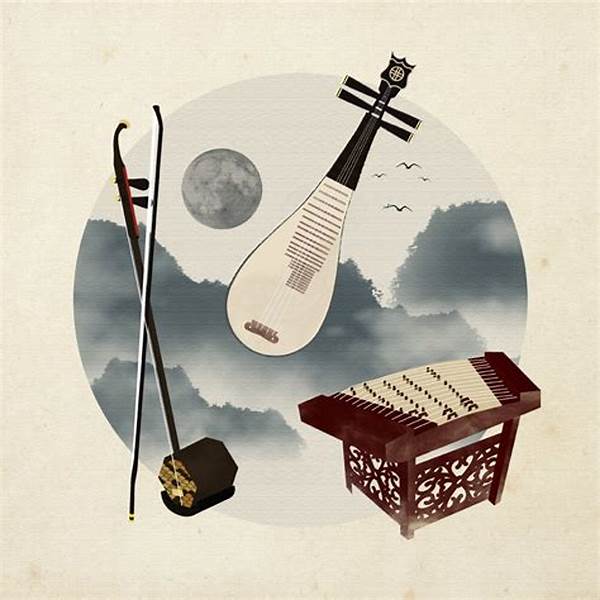In the grand tapestry of Chinese culture, traditional music instruments hold a treasured place, weaving melodious threads that speak to both the heart and the soul. These instruments are not just relics of a bygone era but living embodiments of China’s rich history, favored by emperors and royals who understood the profound language of music. Imagine walking through the serene corridors of ancient palaces, the air imbued with the gentle sounds of the guqin, an instrument beloved by emperors. This scene conjures both a sense of majesty and an irresistible allure, inviting you to explore the depths of this timeless musical heritage.
Read More : History Of Javanese Gamelan Instruments
As with any historical exploration, the journey through traditional Chinese music instruments promises an educational yet entertaining experience. You’ll unearth stories of emperors who not only ruled with an iron fist but also wielded the power of music to maintain harmony and prestige. With a hint of humor here and a splash of narrative intrigue there, dive into anecdotes that reveal how these instruments were more than just musical tools—they were symbols of cultural and political significance, treasured possessions that even spoke the language of the divine.
The Resplendent Guqin: A Symphony of Silence
The guqin, often hailed as the “father of Chinese music,” is a stringed instrument shrouded in legend and mystery. Known for its capacity to evoke a wide range of emotions from tranquility to introspection, the guqin was a favorite of the scholarly elite and royalty alike. Emperors found solace in its delicate notes, using it as a tool for meditation and reflection. Confucius, the great Chinese philosopher, was famously passionate about the guqin, believing that its music was the highest form of art. Emperors revered the guqin not only for its musical prowess but also for its ability to reflect their inner world and philosophical inclinations.
Notable Instruments in the Imperial Court
Besides the guqin, the imperial court was home to many other fascinating instruments such as the erhu, pipa, and dizi. The pipa, with its pear-shaped body and expressive range, was particularly favored for grand ceremonies and court performances. Its evocative sound could mimic the intensity of a galloping horse or the serenity of a flowing river. The erhu, a two-stringed wonder, brought warmth and emotion to any gathering, often used in poignant and celebration-worthy compositions.
The Harmonious Intricacies of the Dizi
The dizi, a traditional bamboo flute, adds a layer of enchantment to imperial music. Its clear, bright tones could effortlessly carry through the vast halls of the palace. Known for its vibrant voice, the dizi’s music was a staple at imperial banquets and festivals, accentuating the grandeur and opulence of the royal lifestyle. The unique feature of the dizi is its ability to produce harmonics and textures that embody the natural beauty of the Chinese landscape—just one reason why emperors and royals held it in such high regard.
Symbolism and Status: Music as a Political Tool
Music served not only as entertainment but also as a political instrument. In the imperial court, music could be a means of governance, maintaining order and demonstrating cultural refinement. The patronage of these traditional instruments by emperors illustrated their sophistication and connection to cultural values. Mastery of these instruments was seen as a mark of erudition and wisdom as well as a symbol of power and prestige.
Read More : Diagnostic Instruments For Respiratory Diseases
The Evolution and Legacy of Imperial Court Music
Fast forward to today, where the echoes of ancient court music still resonate within the contemporary landscape. Efforts have been made to preserve and revive the traditional sounds of these distinguished instruments. Musicians and enthusiasts worldwide continue to study and perform these captivating pieces, ensuring that the legacy of emperors and their beloved music remains an integral part of global culture.
Rediscovering the Depth of Chinese Musical Heritage
Embracing the Timeless Beauty
The allure of Chinese traditional music instruments favored by emperors and royals is undeniable—they stand as a testament to the enduring influence of music on culture and governance. Whether you’re a musician, historian, or merely a curious soul, delving into this musical world promises both enlightenment and entertainment.
Preserving a Rich Tradition
Action Steps for Enthusiasts
In conclusion, the beguiling charm of Chinese traditional music instruments favored by emperors and royals offers a window into a world where music was a vital thread in the fabric of life and governance. Whether you seek to appreciate the intricate sounds or delve deeper into their storied past, these instruments offer endless avenues for discovery and connection to an ancient tradition that still hums vibrantly today.
